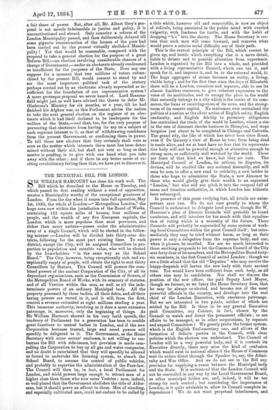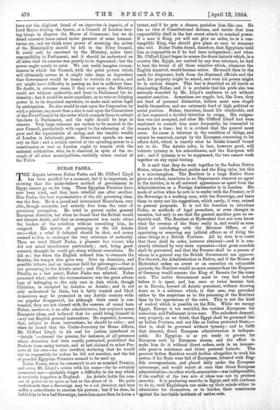THE MUNICIPAL BILL FOR LONDON.
SIR WILLIAM HARCOURT has done his work well. The Bill which he described to the House on Tuesday, and which passed its first reading without a word of opposition, creates a Municipality worthy of the exceptional greatness of London. From the day when it comes into full operation, May lab, 1885, the whole of London—" Metropolitan London," the huge area now within the jurisdiction of the Board of Works, containing 122 square miles of houses, four millions of people, and the wealth of any five European capitals, the London which is more populous than most provinces, and richer than many nations—passes under the administrative sway of a single Council, which will be elected in the follow- ing manner :—London will be divided into thirty-nine dis- tricts, following for the most part existing lines. To each district, except the City, will be assigned Councillors in pro- portion to population and rateable value, who will be elected by the householders "in the same way as the School Board." The City, however, being exceptionally rich and ex- ceptionally empty of people, will obtain the right to seat thirty Councilors by Statute. This Council will possess the com- bined powers of the ancient Corporation of the City, of all its dependant organisations, such as the Commission of Sewers, of the Metropolitan Board of Works, with its armoury of statutes, and of all Vestries within the area, as well as all the inde- terminate powers of an ordinary Municipal body. All the property possessed by these bodies, all their debts, and all their taxing powers are vested in it, and it will, from the first, control a revenue estimated at eight millions sterling a year. This immense authority, involving as it does a most extensive patronage, is, moreover, only the beginning of things. As Sir William Harcourt showed in his very lucid speech, the tendency of Parliament for a generation has been to confide great functions to central bodies in London, and if the new Corporation becomes trusted, large and novel powers will speedily be delegated to it. The Government, as the Home Secretary with some naiveté confesses, is not willing to em-
barrass the Bill with side-issues, but provision is made com- pelling the Corporation to buy up all gas and water companies, and no doubt is entertained that they will speedily be allowed or forced to undertake the licensing system, to absorb the School Board, to assume the control of public vehicles, and probably to supervise the administration of the Poor-law. The Council will then be, in fact, a local Parliament for London, and wield powers large enough to attract men of a higher class than those who now enter Vestries ; men, indeed, so well placed that the Government abolishes the title of Alder- man, lest it should prove an affront to them. Men of standing, and especially cultivated men, could not endure to be called by a title which, however old and respectable, is now an object of ridicule, being associated in the public mind with overfed vulgarity, with fondness for turtle, and with the habit of dropping " h's " into the sherry. The Home Secretary is cer- tain that such men Will come forward, and removes what would prove a serious social difficulty out of their path.
This is the central principle of the Bill, which cannot be given up, and beside which everything else is a mere detail, liable to debate and to possible alteration from experience. London is organised by the Bill into a whole, and provided with a living representative Council, which can tax it, and speak for it, and improve it, and be to the external world, it. The huge aggregate of atoms becomes an entity, a living, visible being ; and for the first time since the days of Elizabeth there will be a London, conscious and separate, able to use its almost limitless resources, to give coherent expression to the voice of its multitudes, and to occupy the place in the world that naturally belongs to a city which is the centre of its com- merce, the focus or receiving-room of its news, and the strong- room of its reserve capital. No statesman ever centralised the 'politics of a nation as the silant action of English safety, English continuity, and English fidelity to pecuniary obligations has centralised the trade of the world in London, where a rise in the rate of discount checks business in Shanghai, and stops bargains just about to be completed in Chicago and Calcutta. The grand city, the like of which has never been since Rome, even if De Quincey's view of Rome be true, from being dead is made alive, and we at least have no fear that its representa- tive body will not be powerful enough or attractive enough to strong men, or sufficiently well watched by the world. There are fears of that kind we know, but they are vain. The Municipal Council of London, its actions, its disputes, its devices, will be studied like any national Assembly, and will soon be seen to offer a new road to celebrity, a new ladder to those who hope to administer the State, a new Almoner to those who would gladly give their wealth to an organised "London," but who will not pitch it into the cesspool full of mean and formless authorities, in which London has hitherto been submerged.
In presence of this great vivifying feat, all details are unim- portant save two. We do not care greatly to whom the Council is authorised to delegate local powers, though Sir W. Harcourt's plan of District Councils will probably be found cumbrous, and will interfere far too much with that equalisa- tion of rating which is a necessity of the future. These Councils will probably be superseded by some system of work- ing local Committees within the great Council itself ; but inter- mediately they may be tried without harm, so long as their power is only a delegation from the supreme body, and can, when it pleases, be recalled. Nor are we much interested in those soothing proposals to let the Common Council of the City seat forty-four of its members, and the Metropolitan Board forty- six members, in the first Council of united London ; though we are a little afraid that the old " Deputies " who may survive the happy-despatch will leaven the new body with their ancient tone. Ten would have been sufficient from each body, as all others also may be candidates. Nor shall we discuss the position of the new officer, the paid Deputy Lord Mayor, though we foresee, as we fancy the Home Secretary does, that he may be always re-elected, and become one of the most powerful officials in the country, and develope into the real chief of the London Executive, with enormous patronage. But we are interested in two paints, neither of which are settled by the Bill. Is there to be any general Executive paid Committee, any Cabinet, in fact, chosen by the Council to watch and direct the permanent officials ; or are affairs to be managed, as in other corporations, by separate and unpaid Committees ? We greatly prefer the former system, which is the English Parliamentary one, and allows of the formation of definite parties in the Council, with clear policies which the electors can understand. The Council of London will be a very powerful body, and if it controls its Executive directly, there may arise the kind of confusion which would exist in national affairs if the House of Commons sent its orders direct through the Speaker to, say, the Admi- ralty and War Office. And we do not see in the Bill any provision for supplying a nexus between the Municipal body and the State. It is understood that the London Council will
not be controlled in any way by the Local Government Board, as other municipal bodies are, and, indeed, it will be too strong for such control ; but considering the importance of London, is it quite advisable to allow its Council complete in- dependence? We do not want perpetual interference, and have not the slightest dread of an imperium in imperio, of a Lord Mayor defying the Queen, or a Council of London levy- ing troops to disperse the House of Commons ; but we do dread excessive loans raised under pressure of some humani- tarian cry, and we think some power of arresting the action of the Municipality should be left to the Privy Council. It could only be exercised by the Ministry, under their responsibility to Parliament, and it should be understood on all sides that its exercise was greatly to be deprecated ; but the power ought surely to exist. We can easily imagine circum- stances in which the Council, with the great power's which will ultimately accrue to it, might take steps so imprudent that Government would be bound to restrain its action, and yet might have difficulty in passing an Act in sufficient time. No doubt, in extreme cases, if they ever arose, the Ministry could act without authority, and trust to Parliament for in- demnity; but it would be more expedient, as no veto or delaying power is to be deposited anywhere, to make such action legal by anticipation. No slur would be cast upon the Corporation by such a proviso, any more than a slur is cast upon the Committees of the Privy Council by the order which compels them to submit bye-laws to Parliament, and the right should be kept in reserve. Very large schemes are certain to be mooted in the new Council, particularly with regard to the rehousing of the poor and the equalisation of rating, and the taxable wealth of London is fabulously great. Democracy spends, we may rely on that ; and a certain control of the spending-power in a constituency so vast as London ought to remain with the national authorities, who, be it observed, in spite of the ex- ample of all other municipalities, carefully retain control of the Police.



































 Previous page
Previous page